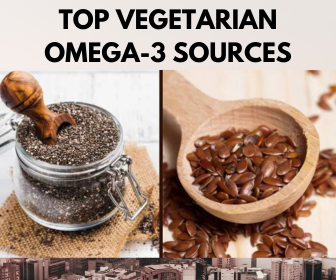Introduction
Omega-3 fatty acids are vital for maintaining good health, but they can be challenging to obtain for vegetarians who don’t consume fish or seafood. Fortunately, there are plenty of vegetarian sources of Omega-3 fatty acids that can provide the necessary nutrients. This guide will explore the health benefits of Omega-3 fatty acids and how you can easily incorporate them into your vegetarian diet.

What Are Omega-3 Fatty Acids?
Omega-3 fatty acids are a type of polyunsaturated fat that our bodies cannot produce on their own. Therefore, we must get them from our diet, and vegetarian sources of Omega-3 fatty acids are a great option for plant-based eaters. Omega-3s are crucial for reducing inflammation, supporting heart health, and promoting brain function.
There are three main types of Omega-3s:
- ALA (Alpha-Linolenic Acid): Found in plant-based sources like chia seeds and flaxseeds.
- EPA (Eicosapentaenoic Acid): Typically found in fish, but also available in algae-based supplements.
- DHA (Docosahexaenoic Acid): Primarily found in fish and algae-based sources.
For vegetarians, ALA is the primary form of Omega-3 fatty acids, while supplements can provide EPA and DHA.
Health Benefits of Omega-3s for Vegetarians
- Heart Health: Omega-3s reduce inflammation, lower cholesterol levels, and improve blood circulation. Studies have shown that a diet rich in Omega-3s can reduce the risk of heart disease and stroke. Learn more about Omega-3 benefits on Healthline.
- Brain Function
Omega-3s, especially DHA, are essential for brain function. They help maintain cognitive function and can reduce the risk of degenerative diseases like Alzheimer’s. EPA and DHA are known for reducing depression and anxiety, making them beneficial for mental health. - Joint Health
Omega-3s have anti-inflammatory properties, which can help alleviate joint pain and stiffness, particularly in individuals with arthritis. Consuming a diet rich in Omega-3s can reduce the need for medications in managing chronic inflammation. - Skin Health
Omega-3 fatty acids help to nourish and hydrate the skin, making it more elastic and improving its overall texture. They can also reduce acne and the symptoms of eczema by controlling inflammation and promoting healing. - Eye Health
DHA is a major structural component of the retina. A deficiency in Omega-3s can lead to vision problems. By consuming sufficient Omega-3s, you can protect your eyes from age-related macular degeneration and other retinal diseases.
Top Vegetarian Sources of Omega-3 Fatty Acids
Here’s a list of the best vegetarian sources of Omega-3 fatty acids that you can easily include in your daily meals:
- Chia Seeds
Chia seeds are one of the best sources of ALA. They are easy to incorporate into your diet, whether you sprinkle them over cereals, blend them into smoothies, or create chia seed pudding. One ounce of chia seeds contains approximately 5 grams of ALA Omega-3 fatty acids. If you’re just starting your journey with supplements, check out our beginner’s guide to health supplements to explore more options for boosting your wellness. - Flaxseeds
Ground flaxseeds are another rich source of ALA. They can be added to baked goods, salads, or even mixed into yogurt. A tablespoon of ground flaxseeds contains around 1.6 grams of Omega-3s, making it an easy way to boost your daily intake. - Walnuts
Walnuts are a convenient snack that is high in Omega-3s. Just a handful provides around 2.5 grams of ALA, making it an excellent addition to your daily meals. You can also add them to salads or breakfast bowls. - Hemp Seeds
Hemp seeds are packed with nutrients, including Omega-3s. Three tablespoons of hemp seeds provide around 1 gram of ALA. They have a slightly nutty flavor and can be sprinkled on top of cereals, salads, or blended into smoothies. - Algal Oil
Algal oil is derived from algae, making it a perfect source of both DHA and EPA for vegetarians and vegans. Algal oil supplements can provide the same benefits as fish oil without consuming animal-based products. - Soybeans
Soy products like tofu and edamame are rich in ALA and offer a plant-based protein boost as well. A half-cup serving of edamame contains around 0.28 grams of ALA. Soy milk can also be fortified with Omega-3s.
Incorporating Omega-3s into Your Diet
To get enough Omega-3s in your diet, aim for variety. Here are some practical ways to incorporate these nutrient-rich foods into your daily meals:
- Add chia seeds or flaxseeds to your morning oatmeal or smoothie.
- Use flaxseed oil as a dressing for salads.
- Snack on walnuts throughout the day or mix them into your granola.
- Sprinkle hemp seeds on top of soups, salads, or cereal for an added crunch.
- Use tofu as a meat substitute in stir-fries and other dishes.
- Take algal oil supplements if you’re looking for a reliable source of EPA and DHA.
Pro Tip: Always grind flaxseeds before consuming them, as the whole seeds pass through your digestive system without releasing their nutrients.
Bonus: Omega-3 Rich Recipe
Chia Seed Pudding Recipe
This quick and easy recipe provides a tasty and nutritious way to boost your Omega-3 intake.
Ingredients:
- 2 tablespoons chia seeds
- 1 cup almond milk (or other plant-based milk)
- 1 tablespoon maple syrup (optional)
- Fresh fruits for topping (berries, banana slices)
Instructions:
- Mix chia seeds and almond milk in a bowl.
- Stir in maple syrup for sweetness.
- Let the mixture sit in the fridge for 4 hours or overnight.
- Top with fresh fruits and enjoy!
Conclusion
Including vegetarian sources of Omega-3 fatty acids in your diet is key to maintaining overall wellness. By consuming chia seeds, flaxseeds, walnuts, and algal oil, vegetarians can meet their Omega-3 requirements for optimal health benefits.
